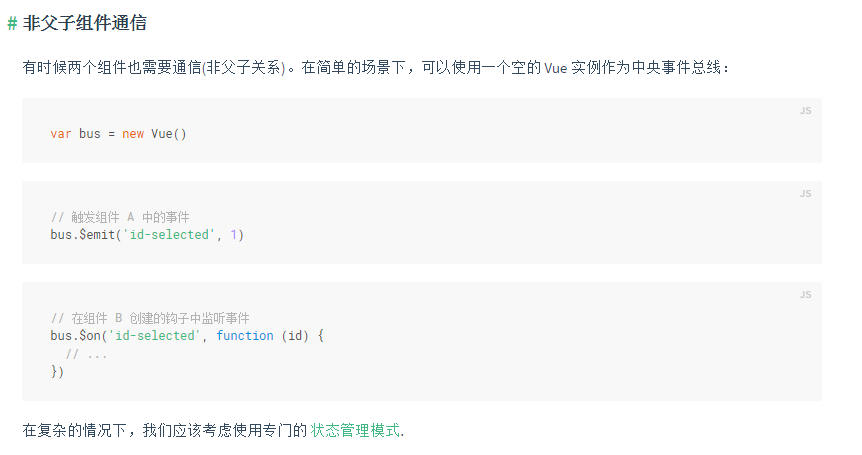这篇文章将为大家详细讲解有关Vue中怎么实现非父子组件通信,文章内容质量较高,因此小编分享给大家做个参考,希望大家阅读完这篇文章后对相关知识有一定的了解。
组件是Vue核心的一块内容,组件之间的通信也是很基本的开发需求。组件通信又包括父组件向子组件传数据,子组件向父组件传数据,非父子组件间的通信。前两种通信Vue的文档都说的很清楚,但是第三种文档上确只有下面的几句

具体如何去实现却没有很详细的说明,于是自己试着进行了实现。先看下简单的通信效果:

就是点击了一个组件,另一个组件的数字递加。
html如下:
<div id="app">
<component-a></component-a>
<component-b></component-b>
</div>再来看一下如何实现每一个组件:
var bus = new Vue() //首先建立一个空的Vue实例作为事件的中转
Vue.component('component-a',{
template: `<div><button @click="incrementB">{{masgA}}</button></div>`, //添加点击事件incrementB ,因为点击A需要增加B
data () {
return {
masgA : 0
}
},
methods: {
incrementB: function () { //增加B的事件
bus.$emit('incrementB') //中转站bus 触发incrementB事件
}
},
mounted: function () {
var _this = this
bus.$on('incrementA',function(){ //中转站bus自定义increamentA事件用来增加msgA,这个事件最终由组件B进行触发
_this.masgA ++
})
//bus.$on('incrementA',()=>{ //这里也可以用箭头函数,就不会有_this这个变量了,因为箭头函数不会改变this指向
// this.masgA ++
//})
}
})从上面的代码可以看出真正的改变方法是通过bus里注册监听事件来实现的,同理代component-b也是一样
Vue.component('component-b',{
template: `<div><button @click="incrementA">{{masgB}}</button></div>`,
data () {
return {
masgB : 0
}
},
methods: {
incrementA: function () {
bus.$emit('incrementA')
}
},
mounted: function(){
bus.$on('incrementB',() => {
this.masgB ++
})
}
})完整代码如下,可直接复制运行
<!DOCTYPE html>
<html lang="en">
<head>
<meta charset="UTF-8">
<title>非父子组件通信</title>
</head>
<body>
<div id="app">
<component-a></component-a>
<component-b></component-b>
</div>
<script src="https://unpkg.com/vue/dist/vue.js"></script>
</body>
<script>
var bus = new Vue() //首先建立一个空的Vue实例作为事件的中转
Vue.component('component-a',{
template: `<div><button @click="incrementB">{{masgA}}</button></div>`, //添加点击事件
data () {
return {
masgA : 0
}
},
methods: {
incrementB: function () {
bus.$emit('incrementB')
}
},
mounted: function () {
var _this = this
bus.$on('incrementA',function(){
_this.masgA ++
})
bus.$on('incrementA',()=>{
this.masgA ++
})
}
})
Vue.component('component-b',{
template: `<div><button @click="incrementA">{{masgB}}</button></div>`,
data () {
return {
masgB : 0
}
},
methods: {
incrementA: function () {
bus.$emit('incrementA')
}
},
mounted: function(){
bus.$on('incrementB',() => {
this.masgB ++
})
}
})
var vm = new Vue({
el: "#app"
})
</script>同时也可以看出这么做仅有两个组件就有些麻烦,事件的流向不是很清晰,所以在出现复杂的场景时需要使用VueX进行管理。
关于Vue中怎么实现非父子组件通信就分享到这里了,希望以上内容可以对大家有一定的帮助,可以学到更多知识。如果觉得文章不错,可以把它分享出去让更多的人看到。
亿速云「云服务器」,即开即用、新一代英特尔至强铂金CPU、三副本存储NVMe SSD云盘,价格低至29元/月。点击查看>>
免责声明:本站发布的内容(图片、视频和文字)以原创、转载和分享为主,文章观点不代表本网站立场,如果涉及侵权请联系站长邮箱:is@yisu.com进行举报,并提供相关证据,一经查实,将立刻删除涉嫌侵权内容。